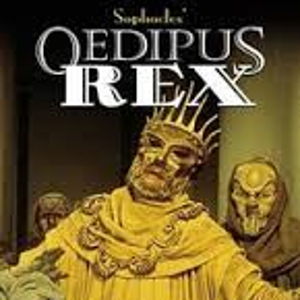
Overview
Synopsis
The newly crowned young king of Thebes, Oedipus, having solved the riddle of the sphinx, has married the widowed Theban queen Jocasta and fathered two daughters. A plague, however, has overtaken his kingdom since he took the throne. Through a series of reveals and hubristic missteps that bring Oedipus’ past to light, he discovers that it is Oedipus himself who has brought this ill fate to his city, having fulfilled a prophecy made when he was born–that he would kill his own father and marry his mother. In its tragic ending, Oedipus the King, or Oedipus Rex as is it known by its Latinized name, is the inspiration for many modern literary and social philosophies, including the concepts of hubris, literary tragedy, and the Freudian Oedipal Complex. This Sophoclean drama, first performed in 455 BCE, is the first in the Oedipus trilogy, which follows the tragic lives of Oedipus and his daughters, culminating in the death of Antigone. Sophocles’ Oedipus is not an original story or plot; the myths and characters of the play would have been well-known to the Greek audience. However, classicists believe that Sophocles added the unique and horrifying element of Oedipus’ self-blindness to his production, a new element that would have made a powerful and memorable impact on a well-known story. Today, Oedipus is perhaps the most well-known and one of the most frequently performed Greek tragedy. It is written without any intermission although some directors choose to divide the play into two acts.
Show Information
Context
Plot
Characters
| Name | Part Size | Gender | Vocal Part |
|---|---|---|---|
|
Lead |
Male |
Spoken |
|
|
Lead |
Male |
Spoken |
|
|
Supporting |
Female |
Spoken |
|
|
Supporting |
Male |
Spoken |
|
|
Featured |
Male |
Spoken |
|
|
Featured |
Male |
Spoken |
|
|
Featured |
Male |
Spoken |
|
|
Featured |
Male |
Spoken |
|
|
Featured |
Female |
Silent |
|
|
Ensemble |
Male |
Spoken |
Songs
A song with an asterisk (*) before the title indicates a dance number; a character listed in a song with an asterisk (*) by the character's name indicates that the character exclusively serves as a dancer in this song, which is sung by other characters.
Monologues
Scenes
Key Terms
The response section of an ancient Greek choral ode, following the strophe and preceding the epode.
A sudden realization or insight experienced by a character, often marking a turning point.
A group in Ancient Greek theatre that commented on the action, represented the public, and provided narrative insight.
Hubris is excessive pride, arrogance, or self-confidence that leads a character to defy moral or divine law. In classical tragedy, hubris often causes the downfall of rulers or heroes who overestimate their own power. It serves as a warning about the dangers of ignoring limits set by the gods, society, or fate.
A body of traditional stories involving gods, heroes, and creation myths. Mythology provides inspiration for characters and narratives in global theatre traditions.
A Prophecy is a prediction or foretelling of future events, usually delivered by a character with divine insight or supernatural authority. In drama, prophecies often create dramatic tension by revealing the outcome before it happens. Characters may try to avoid the prophecy, but their actions usually bring it about, underscoring themes of fate and inevitability.
The first section of an ancient Greek choral ode, paired with the antistrophe and epode in a formal structure.
A Tragedy is a form of drama that explores human suffering, conflict, and loss, often leading to a disastrous or fatal conclusion. Traditionally, the main character experiences downfall due to a personal flaw, poor judgment, or forces beyond their control. Tragedy aims to evoke pity and fear in the audience, leading to reflection and emotional release.
A protagonist whose downfall results from a fatal flaw, central to classical and modern tragedy.
Videos
Quizzes
Themes, Symbols & Motifs
Sorry! We do not currently have learning modules for this guide.
Quote Analysis
Sorry! We do not currently have learning modules for this guide.
